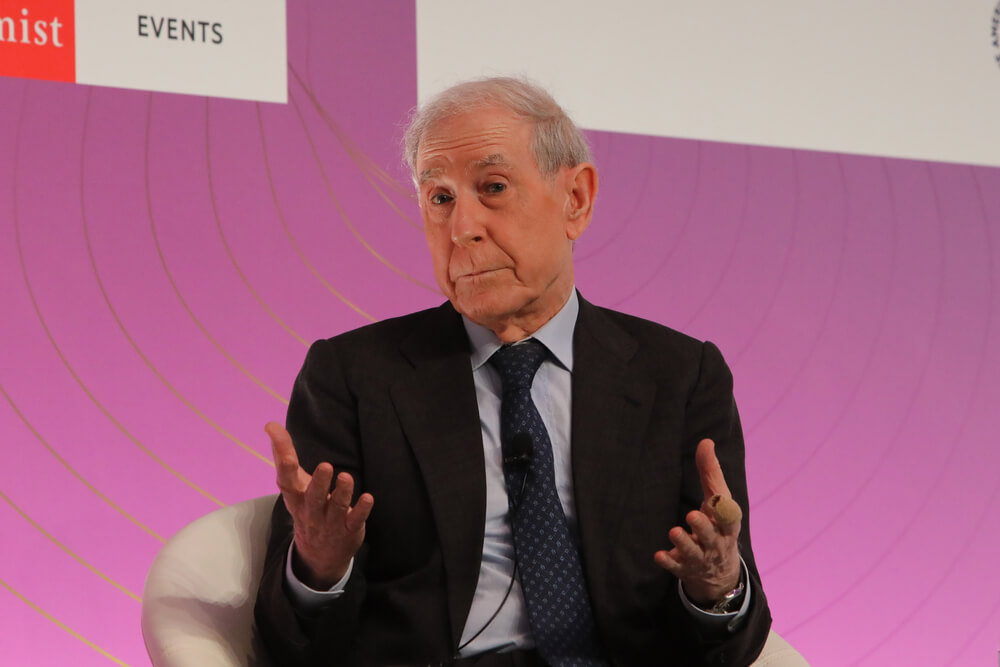Democracies and dictatorships have sharply diverging attitudes toward war. Whereas violent conflict was central to the ideologies that helped perpetuate the totalitarian regimes of the 1930s, democracies went to war with those regimes only as a last resort.
Similarly, Arab regimes in the contemporary Middle East long openly proclaimed their intention to wipe out Israel, whereas Israel engaged only in wars of absolute necessity.
So, when Prime Minister Binyamin Netanyahu keeps Israel mired in wars of choice, one can only conclude that the country is no longer the democracy it claims to be.
Israel’s ongoing war in Gaza began as a justified response to the massacre of some 1,200 Israelis by Hamas on October 7, 2023. But the conflict quickly degenerated into an orgy of wanton violence, civilian suffering, and blatant war crimes.
As an in-depth investigation by The New York Times recently confirmed, Netanyahu could have ended the bloodshed at multiple crucial moments, with the full support of a military that saw no advantage to be gained by more violence. But, every time, he chose to continue the war.
The price of Netanyahu’s cynicism
This decision was entirely self-serving: Netanyahu wanted to perpetuate his own power – and shield himself from being tried on multiple charges of corruption.
His fragile coalition government depends on the support of fascist religious zealots who would be satisfied only with a total Israeli victory – an impossible goal – and Gaza’s indefinite occupation.
To remain in power, Netanyahu has hampered cease-fire negotiations
So, to remain in power, Netanyahu has hampered cease-fire negotiations, thereby delaying the release of the Israeli hostages held by Hamas. When an agreement was reached, Netanyahu broke it.
The price of Netanyahu’s cynicism has been exorbitant. Gaza has endured a severe and escalating humanitarian crisis, while hundreds of young Israeli soldiers have died and thousands more have been wounded – many crippled for life.
Moreover, Netanyahu has scuttled Israel’s chances of securing an historic peace deal with Saudi Arabia that would mark the practical end of the century-long Arab-Israeli conflict.
From Netanyahu’s perspective, however, his Gaza strategy has been a roaring success. He has prevented a state inquiry into his responsibility for the 2023 massacre, though he spent years facilitating Qatar’s financing of Hamas and ignored intelligence alerts prior to the attack. And he has managed to stall his corruption trial.
The erosion of democracy
But that is just the beginning: Netanyahu now holds more power than any previous Israeli prime minister, and he is using it to replace top military and intelligence officials with allies and loyalists.
He is about to succeed in ousting his last remaining “nemesis,” the outspoken Attorney General Gali Baharav-Miara, as part of his government’s long-standing effort to weaken judicial authority and independence.
Meanwhile, Israelis are being inundated with patriotic bombast, in an effort to distract from the erosion of its democracy.
Many of Netanyahu’s tactics resemble those used by Russian President Vladimir Putin since he launched his full-scale invasion of Ukraine in 2022.
Like Netanyahu, Putin has thrown away opportunities to end the war on favorable terms
Like Netanyahu, Putin has used conflict to strengthen his grip on power. And, like Netanyahu, Putin has thrown away opportunities to end the war on favorable terms.
Had Putin accepted a cease-fire a few months ago, US President Donald Trump would have effectively handed him all the Ukrainian land Russia has seized since over the course of the invasion. But Putin wants more.
He wants Russia to enjoy sovereignty over all of eastern Ukraine (in addition to Crimea), with what is left of Ukraine becoming a disarmed “neutral state.”
And he wants NATO to retreat westward, so that the Kremlin can reclaim its former “sphere of influence.” He will not settle for anything less.
Russia and Israel are locked in interminable wars of choice
Putin and Netanyahu have something else in common: they are committed to insulating key political constituencies from the effects of their wars.
Putin remembers well how a rising body count in Afghanistan helped convince Soviet elites to abandon the regime.
 Russia and Israel are locked in interminable wars of choice, each sustained by the cynicism and self-interest of one man - Shlomo Ben-Ami
Russia and Israel are locked in interminable wars of choice, each sustained by the cynicism and self-interest of one man - Shlomo Ben-Ami
That is why he has avoided large-scale conscription (and kept Russia’s urban middle classes and bureaucratic elites off the battlefield) by maintaining a vast contract army recruited, in exchange for massive payouts, from Russia’s poorer provinces.
While Russian casualties in Ukraine are soaring, the precise figures are impossible to know for certain; Russian media certainly are not reporting them.
In Israel, there is a saying: Bnei Brak, home to the country’s largest ultra-Orthodox community, is “free of military funerals and bereaved mothers.” Netanyahu made sure of that by guaranteeing ultra-Orthodox men’s exemption from military service.
Since ultra-Orthodox factions are key to the survival of Netanyahu’s coalition, he has also drastically expanded the lavish subsidies that enable this community to pursue a parasitic way of life, even as Israel struggles to cover the costs of its wars against Hamas, Hezbollah, the Houthis, and Iran.
Putin and Netanyahu are careful to shroud their true intentions with ideology. The “eternal Russia” is locked in a permanent conflict with a depraved West bent on annihilating it, and the besieged Jewish state faces existential threats from all sides, not least Hamas. Both leaders liken their enemies to the Nazis.
The reality, however, is far bleaker. Russia and Israel are locked in interminable wars of choice, each sustained by the cynicism and self-interest of one man.
In both cases, the decadence of the “rules-based” international order that arose from the ashes of World War II has allowed them to continue.
Shlomo Ben-Ami, a former Israeli foreign minister, is Vice President of the Toledo International Center for Peace.